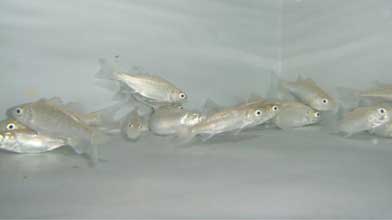Both the olfactory system and the central brain function of marine or saltwater fishes are being compromised by elevated carbon dioxide levels. Survival of these fish, due to exceeding CO2 levels, has also been threatened, as confirmed by scientists who used electrophysiological measurements and transcriptomics with behavioral experiments as investigation tools.
High exposure to carbon dioxide levels leads to impairment of γ-aminobutyric acid receptors which are essential for unaltered responses to sensory cues. There is a potential for a major ecologically-relevant impairment of fitness for marine fishes as a consequence of rising CO2.
Dr. Porteus along with Dr. Rod Wilson, Dr. Stephen Simpson and the team at the University of Exeter suggested that increasing levels of CO2 in the oceans is leading to ocean acidification. The altered pH of oceans, in turn, impairs the olfactory system and brain function of certain fish.
This research has a greater scope that is in understanding comparative and integrative physiology, specifically the mechanisms by which animals respond to environmental change to maintain homeostasis.
This particular study acknowledges the dynamics of ion, water, and acid-base balance, respiratory gas exchange, sensory and orientation response, and how these mechanisms are integrated within each other and with behavior. It also gives perspective about the disturbances caused by the influence of environmental toxicants such as metals and rising carbon dioxide levels.
Ocean Acidification
For more than 200 years, or since the industrial revolution, the concentration of carbon dioxide (CO2) in the atmosphere has increased due to the burning of fossil fuels and land-use change. The ocean absorbs about 30 percent of the CO2 that is released into the atmosphere, and as levels of atmospheric carbon dioxide increase, so do the amounts in the ocean.
These changes in ocean chemistry can affect the behavior of non-calcifying organisms as well. Certain fishes' ability to detect predators is decreased in more acidic waters. When these organisms are at risk, the entire food web may also be at risk.

Ocean acidification (Source: Getty images)
Sensory and Orientation Response: A Critical Need for Survival in Fishes
Physiologists have long-known that CO2 directly affects acid-base and ion regulation, respiratory function and aerobic performance in aquatic animals. More recently, many studies have demonstrated that elevated CO2 (e.g., 800–1000 µatm), projected for the end of this century, can also impact physiology, and have substantial effects on behaviors linked to sensory stimuli (smell, hearing, and vision), both having negative implications for fitness and survival.
Fish rely heavily on olfaction to find food, recognize organisms and predators, for the perception of reproductive status and to go towards suitable habitats, including spawning grounds and larval settlement.
According to a study conducted by Australian Research Council Center of Excellence for Coral Reef Studies, along with other centers globally, the larval clownfish reared in control seawater with a pH of 8.15, discriminated between a range of cues, which could help them locate reef habitat and suitable settlement sites. This discriminatory ability was disrupted when larvae were reared in conditions simulating CO2-induced ocean acidification. Interestingly, at pH 8.15, the larvae immediately responded to olfactory stimuli. They avoided olfactory stimuli at levels of ocean pH 7.8, predicted to be the case in 2100. At a pH of 7.6, the larvae no longer responded to any olfactory cues.
Therefore, if acidification continues unchecked at the present rate, then the impairment of sensory ability will reduce population sustainability of many marine species, with a potentially intense influence on marine diversity.
Effects of Elevated CO2 Levels on Olfactory Systems of Aquatic Life
According to an investigation conducted at the University of Exeter, elevated CO2 can directly affect the olfactory system of fish, given that the olfactory epithelium is in intimate contact with seawater.
This is a new hypothesis, for various mechanisms, in understanding the sensory stimuli in marine fishes under the influence of rising CO2 levels. The study used the European sea bass as a model species to test this theory.
The study recorded behavioral responses to the odor of predators like bile from a monkfish, Lophius piscatorius. The data showed that the fish that were exposed to increased CO2 reduced their baseline activity (i.e., swimming) by up to 40% compared to fish with controlled CO2 levels. This difference was also independent to the duration of exposure.
Furthermore, the control sea bass reduced their activity by 50% in the presence of the predator odor, whereas sea bass exposed to greater CO2 levels reduced their activity by only 20–27%. This clearly showed that the marine creatures in the latter situation were not able to sense the presence of a predator due to their reduced olfactory sensitivity.
Both control and elevated CO2-exposed fish displayed freezing behavior (not moving for more than 5 seconds at a time), after days 2 and 7 of exposure. However, at 14 days, fish exposed to elevated carbon dioxide levels spent significantly more time freezing before and during exposure to a predator cue. This behavior indicated a direct threat to their survival.
In freshwater fish and marine crabs that were exposed to elevated CO2 or low pH, the loss of response to some odorants, including alarm cue, was attributed to structural and functional changes of the chemical cues themselves. This is also a potential explanation for how high carbon dioxide affects odorant–receptor binding.

European sea bass as seen in study conducted in Exeter University. (Source: University of Exeter)
Alteration in Gene Expression of Fishes by Ocean Acidification
Another interesting study conducted by Celia Schunter and her team suggested that there was a direct effect of high CO2 on global gene expression patterns in the brains of certain fish. The team found that in the juvenile, spiny damselfish (Acanthochromis polyacanthus), genes that are relative with brain glucose, serine and glycine metabolism were differentially expressed in those exposed to elevated CO2.
These findings were consistent with Dr. Porteus' work which indicated that the response to glutamate was affected the most by elevated carbon dioxide, through both electrophysiology and RNA-sequencing (RNAseq) results.
Though rising CO2 levels and ocean acidification are a direct threat to the marine ecosystem, scientists also predict adaptation mechanisms for respective species. But to understand the level of adaptation and its effect on the oceanic ecosystem is a massive but, extremely important, question for humans, especially keeping food security in mind.
Top Image: Zebrasoma flavescens or the Yellow Tang is a marine or saltwater fish. Scientists have observed that such creatures are losing their olfactory systems due to the effects of climate change. (Image Source: Adrian Pingstone @ Wikipedia)
References
Porteus et al., (2018), Near-future CO2 levels impair the olfactory system of a marine fish, Nature Climate Change volume 8, pages 737–743.
Schunter et al., (2016), Molecular signatures of trans-generational response to ocean acidification in a species of reef fish, Nature Climate Change volume 6, pages 1014–1018.
Munday et al., (2009), Ocean acidification impairs olfactory discrimination and homing ability of a marine fish, PNAS.
NOAA. Available at: https://oceanservice.noaa.gov/facts/acidification.html







No comment